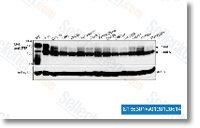Gross complete resection intensive resection on the tumor with the time of original diagnosis was connected with statistically sizeable increased survival when in contrast to sub complete resec tion partial resection, Individuals older than 65 to 75 years of age, not like younger patients, tend to be not presented aggressive surgery due to the fact of their age, asso ciated comorbidities as well as the prospective inability to toler ate surgical treatment. Within a latest examine reported by Oszvald et al, the general survival of older sufferers aged greater than 65 many years was significantly reduce than that of younger patients, Nonetheless, age was a damaging prognostic issue in patients undergoing biopsy, but not in patients undergoing tumor resec tion, Survival of older individuals undergoing comprehensive tumor resection was 17. seven 8. 1 months and in contrast favorably with younger patients emphasizing the importance of surgical procedure.
Radiation therapy stays the submit operative backbone during the management of sufferers with glioblastoma. Our study confirms the significance of radiation remedy in prolonging the survival knowing it of sufferers with glioblastoma. Each the No radiation group along with the Unknown radi ation group showed a marked decreased survival when in contrast to your Yes radiation group of sufferers. Stud ies by Filippini et al. have shown that radiotherapy in glioblastoma sufferers can improve survival, by using a 1 the radio sensitivity of GBM as most patients relapse immediately after original response. Tumor tissue hypoxia continues to be reported as a significant mechanism involving tumor resistance to radiation, and applying substances that may in crease tumor sensitivity to radiation is getting encouraged, In the landmark randomized review, Stupp et al. reported that delivery of temozola mide for the duration of radiotherapy increased survival, suggesting that this DNA alkylating agent can boost survival by enhancing radiosensitivity of GBM cells.
This review reported the general survival costs with radiation and temozolamide for being 27. 2% at two many years, 16. 0% at 3 many years, twelve. 1% at TWS119 four years and 9. 8% at 5 years, SRS is currently being increasingly utilized to deal with recurrent tumors as it can target any area on the brain with intense accuracy, thereby minimizing the result of radiation to the adjacent brain tissue as well as the vital structures nearby. SRS could be utilised many occasions in select situa tions and also may be utilized to treat many web pages of recurrences in the very same treatment method setting. Latest studies have shown that re irradiation with stereotactic radio surgery for recurrent glioblastoma is a quite helpful and possible approach of improving survival,  The complex molecular and biologic variables leading to the development of glioblastomas are beginning to become unraveled and our understanding of molecular patho genesis has elevated appreciably during the last two decades.
The complex molecular and biologic variables leading to the development of glioblastomas are beginning to become unraveled and our understanding of molecular patho genesis has elevated appreciably during the last two decades.
Natural Product
A natural product is a chemical compound or substance produced
